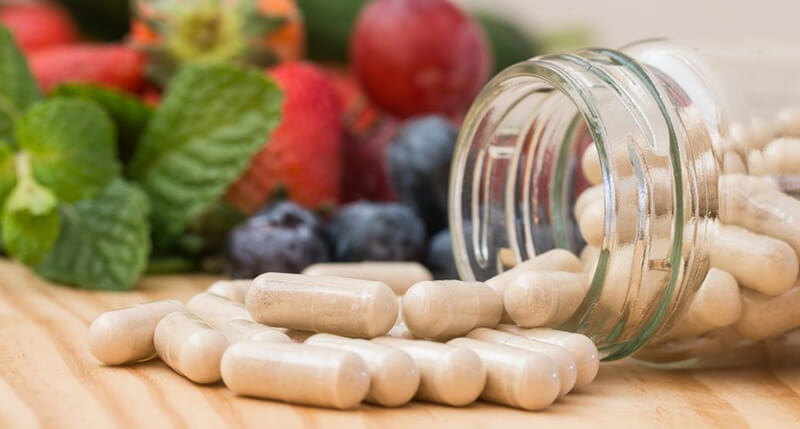The Role of Nutrition in Health
The association between diet and health has been created for quite a while, dating back to Hippocrates (470-377 BC and even sooner (1).
Studies have demonstrated that the association between eating a more healthy diet, especially one that includes lots of fruit and veggies, using a lesser risk of obesity and cardiovascular disorders, in addition to a lot of different ailments (two, 3).
What Happens Can from Your Body
Antioxidants help counter the negative effects of free radicals.
Oxidative stress occurs when there’s an imbalance between the generation of free radicals and the capability of the body to counteract their harmful effects and is considered to play a part in the maturation of a lot of different health conditions (4).
The body naturally produces carbohydrates however these aren’t necessarily generated in adequate quantities so foods & nutritional supplements can help fill the gap.
Foods That Contain Antioxidants
Increasing antioxidants can be accomplished via after a diet and eating foods like whole grains, nuts, and legumes, in addition to lots of fruit and vegetables such as berries, citrus fruits, green leafy lettuce and bell peppers on a standard basis (4).
Fruit and vegetables have a variety of micronutrients (vitamins and minerals), a number of which have antioxidant properties. All these will be the vitamins A, E and C, and the minerals copper, zinc and selenium (5).
These are regarded as essential micronutrients since our bodies can’t make them so they have to be taken in through food.
The Part of Supplementation
Despite a lot of studies on the supplements of vegetables and fruit, it’s still unclear which elements are beneficial for the health.
This has caused a heightened interest in the possible role of antioxidant supplements.
Though supplements can help top up your intake of antioxidants, it’s advised to acquire the vast majority of them throughout the foods mentioned previously.
6 Supplements using the Maximum Quantity of Antioxidants
Vitamin C
Vitamin C, also called L-ascorbic acid, is a fat-soluble vitamin. This implies it has to be taken in through food or supplements on a daily basis since it cannot be stored within the body.
It’s frequently utilized to decrease the signs of the frequent cold.
Vitamin C can behave as both an antioxidant and pro-oxidant, based on just what the body requires. This enables it to serve many different functions within the body.
Like other antioxidants, it operates by targeting free radicals within the body. It’s replenished by antioxidant enzymes and its construction enables it to target numerous different physiological systems.
Vitamin C can be found in large quantities in fruit and vegetables, especially citrus fruits such as oranges and dark green leafy veggies such as broccoli.
How can vitamin C improve health?
Vitamin C, through its anti-inflammatory capacity, has been proven to enhance blood circulation relative to placebo in healthy individuals (7). Additionally, it has been proven to be more effective in increasing blood circulation in people that have health ailments, such as tachycardia syndrome, in which a reversal from lying to standing causes an abnormally big increase in a heartbeat (8).
Studies also have demonstrated that vitamin C supplementation can decrease the impact of free radicals generated from exercise (9). Additionally, it can assist with decreasing perceived muscle soreness and also a marker of muscle damage (creatine kinase levels) related to exercise (10).
Studies have also discovered that vitamin C may lower blood sugar levels. In a randomized, double-blind, placebo-controlled analysis, taking 500 milligrams of vitamin C per day resulted in a substantial decrease in fasting blood glucose, postprandial blood sugar levels, and Hba1c levels in comparison with the placebo group (11).
Other research has found that vitamin C supplementation may decrease inflammation and metabolic markers in both those with diabetes and those who have higher blood pressure (12). Supplementing with vitamin C has also been proven to reduce blood pressure relative to placebo (13).
Owing to its antioxidant action, studies have shown that vitamin C may upregulate antioxidant enzymes in the human body, reducing oxidative stress and enhances insulin sensitivity (14).
Additionally, it has been proven to work in preventing bone loss related to oxidative stress in the older (15).
How can I take vitamin C?
The Recommended Daily Intake (RDI) of vitamin C is between 100 and 200mg. However, higher doses of up to 2,000milligrams may be utilized to encourage the immune system and/or lower the distance of the frequent cold.
Most research use 1000mg daily and this is the recommended daily dose, so automatically divide into two 500 mg doses to reevaluate absorption.
Vitamin E
Vitamin E identifies eight molecules, which can be split into two groups: tocopherols and tocotrienols. Each of those categories is divided into alpha (α), beta (β), gamma (γ), and delta (δ) vitamers.
Vitamin α-tocopherol is regarded as the primary one and can be located within most vitamin E supplements.
Vitamin E is a fat-soluble vitamin, meaning it is stored within the body.
Vitamin E has been the primary antioxidant compound to be marketed as a dietary nutritional supplement, which has been followed by vitamin C. It’s occasionally used as the benchmark antioxidant chemical when fat-soluble compounds have been investigated and can function as a signaling receptor in cells and also for phosphate groups.
Vitamin E is found in large quantities in foods like seeds, nuts, and vegetable oils.
How can vitamin E improve health?
Likewise to vitamin C, vitamin E has also been shown to boost blood circulation. Vitamin E supplementation as alpha-tocopherol in 1,000 IU for 2 months has been found to boost the vitamin E content of LDL particles and lower their oxidation susceptibility also enhance blood circulation (16).
Studies also have demonstrated that supplementation of Vitamin E can decrease blood pressure, but when taken in dosages of 160mg or 320mg since 80mg failed to show a beneficial impact (17). Additionally, only the maximum dose in this study (320mg) revealed an improvement in the antioxidant capacity of the blood. Effects on blood pressure consequently appear to be more dose-dependent.
Vitamin E supplementation has also been shown to reduce oxidative stress but just when the supplement is obtained within a longer period of time plus a higher dose is obtained (18). This study demonstrated a dose of between 1,600 and 3,200IU daily for 16 weeks was effective in reducing oxidative stress.
Vitamin E may also enhance immunity. Supplementation of 800mg of all alpha-tocopherol daily for 30 days healthy elderly people over age 60 was proven to raise indices of both T-cell mediated immunity (19).
Studies have also discovered that vitamin E may increase immune responsiveness. Daily supplementation of 50mg and 100mg of Vitamin E (as alpha-tocopherol) for 2 months at the older significantly increased immune-supportive heights of IL-2 whilst diminishing IFN-gamma concentrations (20).
How do I take vitamin E?
Maintaining sufficient levels of vitamin E in the body can be reached by taking a daily dose of 15mg (22.4 IU). For older individuals taking the nutritional supplement to improve immunity, a 50-200mg dose is suggested.
Vitamin E supplements must always comprise α-tocopherol.
Vitamin E’s antioxidant properties have been enhanced when taken together with unsaturated dietary fat, like seeds and nuts, with a perfect range being between 2-4 IU per g of unsaturated fat.
Although large doses of over 400IU α-tocopherol (268mg) may be taken over the short term, there’s the possibility of long-term unwanted effects. When taking vitamin E to a long-term foundation, it’s ideal to adhere with an upper limit of 150mg every day.
Curcumin
Curcumin is a yellow pigment found chiefly in turmeric, where it’s the key bioactive substance. It’s a polyphenol with anti-inflammatory properties and to raise the number of antioxidants the body creates.
Curcumin and the curcuminoids exist in garlic at approximately 22.21-40.36mg/g from the rhizomes and 1.94mg/g from the tuberous roots, meaning that turmeric is a lot less potent. But, curcumin and the curcuminoids found in garlic may be extracted to create nutritional supplements.
It’s likely that garlic provides some advantages that curcumin doesn’t but more study is required to ascertain if this is the situation.
Curcumin is consumed relatively badly during digestion and so many nutritional supplements contain other ingredients that enhance the bioavailability, such as black pepper.
How can curcumin promote health?
Studies have revealed that curcumin is effective in enhancing the body’s antioxidant enzyme profile.
1 study found that supplying healthy middle-aged people between the ages of 40 and 60 using a reduced daily dose of curcumin (80 milligrams ) for 2 weeks was effective in enhancing several significant biomarkers (21).
This comprised lowering plasma triglyceride values, plasma beta-amyloid protein concentrations, plasma alanine aminotransferase actions, salivary amylase levels, and plasma sICAM readings.
Supplementation also improved salivary radical scavenging capabilities, plasma catalase plasma myeloperoxidase without raising c-reactive protein levels and increased nitric oxide.
Curcumin has also been proven to decrease oxidative damage (22).
A study found that supplementation of three daily doses of 250mg significantly reduced cognitive impairment after annually.
Curcumin, dosed at 1,000mg obtained in 2 daily doses for 12 months was demonstrated to decrease the clinical and clinical indicators of atherosclerosis (23).
Additionally, it has been proven to exert anti-inflammatory effects in people with type 2 diabetes when 1500mg had been obtained every day (in 3 doses) for 2 weeks (24).
Supplementation with curcumin has also been discovered to have an anti-inflammatory impact on people who have rheumatoid arthritis.
In a randomized, double-blind, placebo-controlled trial, 36 participants had been assigned to take a placebo, 500 mg, or 1,000 milligrams of a bioavailable curcuminoid extract (95% curcuminoids) for 2 weeks (25).
Both the curcumin groups had reductions in symptoms, with higher effects being observed from the group receiving the higher dose. Both these groups also needed a large, statistically significant decrease in c-reactive protein, an integral marker of inflammation, together with all the high dose group viewing a larger decrease.
Additionally, the curcumin groups had a remarkable decrease in erythrocyte sedimentation rate, another important indicator of inflammation.
The anti-inflammatory effects of curcumin may also help reduce pain.
A randomized, double-blind, placebo-controlled trial between 53 individuals with migraines has been assigned to take either 1,500 mg of a curcuminoid complicated (95% curcuminoids) with 15 milligrams of piperine or placebo per day for 2 months (26). There has been a statistically significant decrease in pain and an improvement in function in comparison with the placebo group.
How can I take curcumin?
On its curcumin isn’t well absorbed so it’s encouraged to have a nutritional supplement that’s paired with a chemical that could improve bioavailability.
The most usual is black pepper extract, also referred to as piperine. However, it may also be combined together with lipids.
Curcumin is generally taken with meals.
To acquire the health benefits of curcumin, it’s suggested to choose between 80 mg and 1500 mg every day, using a lesser dose being suitable for people who are generally healthy and the higher dose is suitable for anyone who has inflammatory ailments.
Doses up to 8 g of curcuminoids aren’t associated with severe adverse effects but additional long-term studies are required to verify that. At elevated doses, curcumin may lead to nausea and gastrointestinal troubles.
Resveratrol
Resveratrol is the valuable compound found in red wine, and this is generated on blossoms as a defense against poisons and can be located inside the skins of grapes. It’s likewise in peanuts and berries.
Resveratrol shares many advantages with bioflavonoids, a set of plant-derived substances with antioxidant properties.
Besides being an antioxidant, resveratrol is likewise an anti-inflammatory, anticarcinogenic, cardioprotective, vasorelaxant, phytoestrogenic and neuroprotective agent (27).
It’s frequently reported as having the ability to expand lifespan but that appears to be on account of such other effects, instead of being a direct mechanism.
It’s largely regarded as an oral nutritional supplement but is also occasionally used topically to reduce acne.
How can resveratrol promote health?
Resveratrol has been proven to reduce blood pressure. In patients that have undergone myocardial infarction (a heart attack), supplementing with resveratrol in 10mg daily for 3 weeks significantly increased blood circulation and improved heart function (28).
It was also discovered that resveratrol decreased LDL cholesterol and blood sugar levels.
Cerebral circulation has also been proven to be raised using resveratrol supplementation.
In a randomized, double-blind, placebo-controlled, crossover study, discovered that carrying 250mg or 500mg of resveratrol enhanced cerebral blood circulation and oxygen turnover in a dose-dependent way (29).
Supplementation with resveratrol has also been proven to reduce blood pressure. 150 mg taken daily for 30 days has been found to reduce systolic blood pressure, lower triglyceride levels, enhance insulin sensitivity and liver enzyme operation (30).
Much like other antioxidant nutritional supplements, resveratrol reduces oxidative stress. Accepting 10mg of resveratrol per day (in 2 doses) for 2 months has been demonstrated to decrease markers of oxidative stress, in addition, to enhance insulin sensitivity (31).
How can I take resveratrol?
The lower end of supplementation (5-10mg per day ) will be optimal for cardiovascular wellness, insulin sensitivity, and endurance for normally healthy men and women.
For all those who have health problems, a greater dose of between 150 and 445mg is suggested. But more study is required to find out the best dose.
Alpha-Lipoic Acid
Alpha-lipoic acid (ALA) is a bronchial chemical significantly involved in energy metabolism. It’s synthesized in the body and can be found in meat, vegetables and fruit.
It’s a potent antioxidant since it functions with mitochondria (called the powerhouses of the cells) along with the human body’s natural antioxidant defenses. Additionally, it appears to have the ability to reverse the oxidant damage connected with aging, decrease inflammation and help prevent a range of ailments.
ALA is water-soluble from the gut and can be consumed by transporters so doesn’t need to be absorbed along with lipids, unlike a few other antioxidants.
How can alpha-lipoic acid improve health?
Alpha-lipoic acid was proven to boost blood circulation. A randomized, controlled, double-blinded study found that supplementation of 600mg alpha-lipoic acid per day for 21 days has been found to significantly boost blood circulation (32).
Additionally, supplementation of alpha-lipoic acid per day for three weeks was shown to improve endothelial function as a consequence of decreasing oxygen-derived free radicals (33).
Studies have also discovered that lipoic acid can decrease blood sugar levels. Supplementation of 90mg of lactic acid, 250mg of vitamin C and 600IU f vitamin E per day for 2 weeks has been found to significantly decrease blood sugar levels, according to HbA1c (34).
Another study also reported that 300, 600, 900, or 1,200milligrams of lipoic acid obtained daily for 2 months was successful in reducing blood sugar levels and this happened in a dose-dependent way (34).
Alpha-lipoic acid has also been shown to decrease inflammation. A randomized, double-blind research found that supplementation of 150 mg irbesartan (a blood pressure medicine ), 300 milligrams of alpha-lipoic acid 300 milligrams or both considerably reduced pro-inflammatory markers within the human anatomy (35).
How can I take ellagic acid?
Standard doses of ALA utilized in research usually are between 300mg and 600mg daily. It doesn’t want food to be consumed so can be obtained at a fasted state.
Spirulina
Spirulina is a blue-green alga, which is frequently employed as a supply of vitamin B12 and protein by vegans. It’s a range of active components, the most important component being phycocyanobilin, which includes roughly 1 percent of spirulina.
This mimics the body’s bilirubin chemical to inhibit an enzyme complex named Nicotinamide Adenine Dinucleotide Phosphate (NADPH) oxidase, which contributes to both anti-inflammatory and antioxidant consequences.
How can spirulina promote health?
Various studies have revealed that spirulina can decrease cholesterol levels, in addition to lots of additional health markers. A randomized, double-blind, research found that supplementation of 8g of spirulina for 2 months at a healthy older population of adults between 60 and 90 years old has been discovered to enhance lipid profiles, resistant factors and antioxidant capability (36).
Supplementation with spirulina may also improve exercise performance.
A double-blind, placebo-controlled, counterbalanced crossover analysis found that 6g of spirulina taken daily for 2 months managed to significantly improve exercise performance (as measured by time to fatigue ) and fat oxidation in contrast to placebo, in addition to diminishing markers of oxidation (37).
Spirulina may also help restrain allergies. Supplementation of 2g spirulina every day for 2 months has been found to decrease nasal discharge, coughing, sinus congestion and congestion (38).
How do I take spirulina?
Doses used in studies of spirulina have varied widely, which makes it hard to ascertain the most optimum dose. Doses of between 1 and 2 8g daily appear to supply positive consequences, which is determined by the health problem it’s used for.
The dose of spirulina employed in research analyzing its consequences vary considerably.
Generally, 1-8 gram every day of spirulina was proven to have positive consequences. More study is required to needed to ascertain if spirulina ought to be taken once per day, or at smaller doses several times every day.
Irrespective of how it’s accepted, it isn’t encouraged to take over 8g daily as there appear to be no additional benefits then amount.
The Main Point
Your body naturally produces antioxidants and you’ll be able to get lots of them out of eating a nutritious diet with lots of vegetables and fruit. But, supplementation can be useful, especially if you’re wanting to decrease the signs of a specific health condition.
If you’re taking any drugs, it’s necessary to consult your physician first before taking one of these supplements, which also applies if you’re pregnant or breastfeeding.
In general, antioxidant nutritional supplements can help reduce the damaging impact of a build-up of free radicals, reducing the threat of disease in addition to helping improve lots of health markers within the body.





